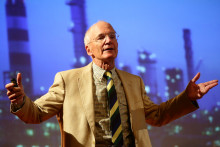Professor Cussler is an accomplished researcher, who received several awards. One of them is Ig Nobel Prize, a prize intended to ´honor achievements that first make people laugh and then make them think´, which Cussler obtained for his experiment testing whether people could swim faster in syrup or in water. Swimming in syrup was, however, not the topic of his talk at the UT.
´I want to speak to you from among the audience, because what I have to say has more to do with your lifetime than mine,´ Cussler began his speech focused on the future of chemical industry.
Chemicals transform the world
´Before you decide you are not interested in the chemical business, look around you. Most of what you are wearing didn´t exist when I was a student, but now it´s a regular part of our daily lives. And that is thanks to the chemical business,´ said Cussler. Chemical industry has truly transformed our world and some of its inventions, such as chemical fertilizers, might be controversial but they also save lives. Will it last, though?
´The truth is that chemicals may not be sustainable,´ stated Cussler. ´Chemical plants depend on resources such as goal or gas, resources all located in only a few places on the planet, most of them being politically unstable areas mainly in the Middle East. So the question is how to develop chemical business in other parts of the world?´
Biofuels as a solution
It probably doesn´t come as a big surprise that the answer lies with renewable fuels, such as biofuel based on alcohol made by fermentation. ´As opposed to traditional chemical plants that are centralized, biofuel synthesis is dispersed over large areas. Bigger is not better in this case.´ According to Professor Cussler, the future of chemicals therefore seems to be associated with disperse manufacturing and natural sources of energy. Only time will show.









